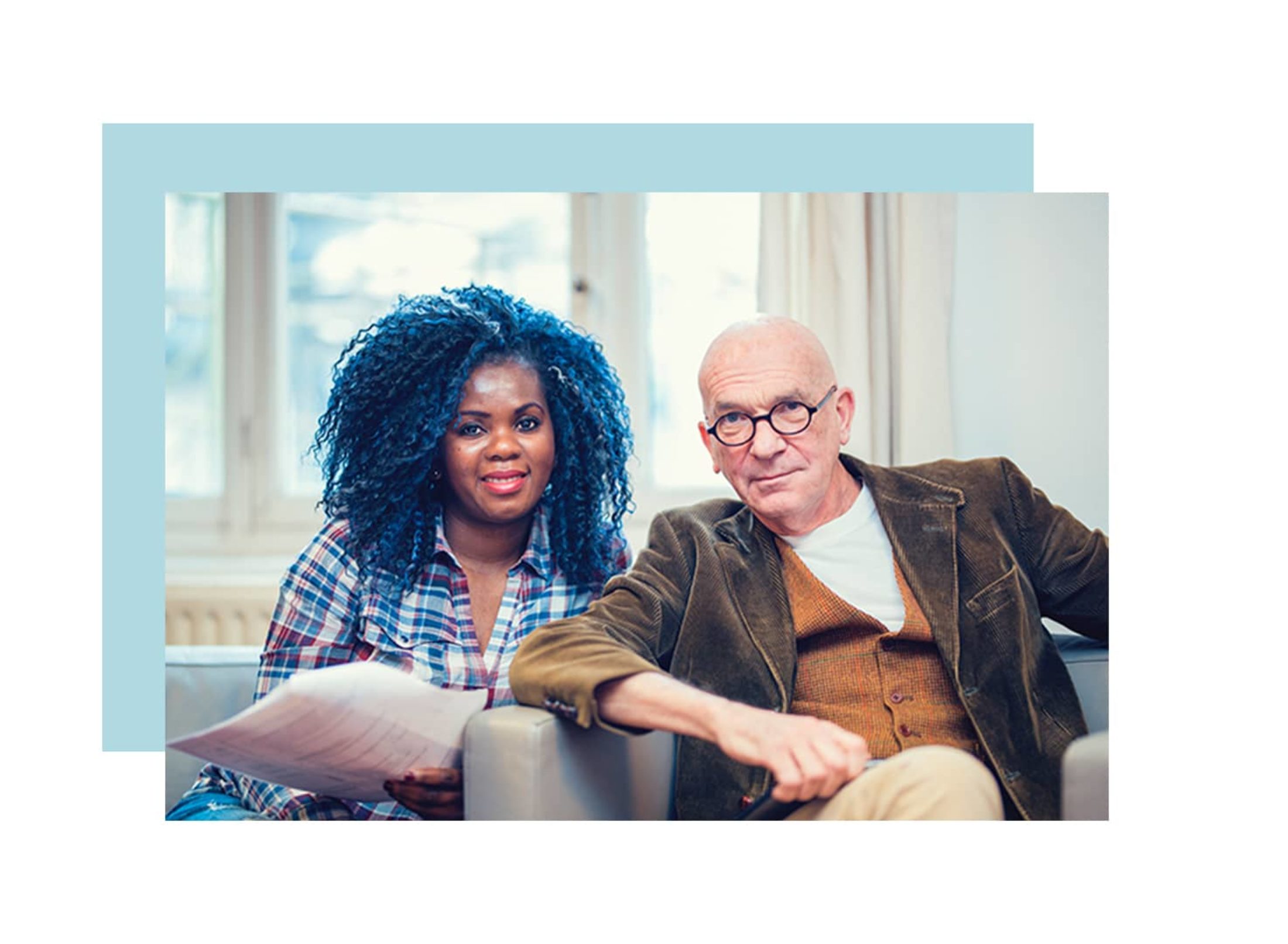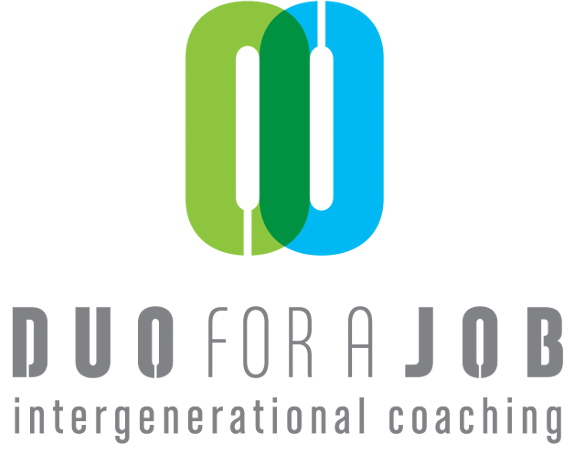DUO for a JOB, intercultural and intergenerational mentorship towards a job

Just over a year ago, DUO for a JOB, a not-for-profit organisation, opened a branch in the Charleroi Metropolitan Area. The aim? To form duos consisting of a mentee (a young person with an immigrant background) and a mentor (someone aged over 50 with professional experience) in order to move forward together and to drive the young person’s career forward.
Mentors for the not-for-profit organisation
Guy and Alain, and mentee Mariama talk about their experience.
How did you hear of DUO for a JOB, the not-for-profit organisation?
Guy: I wanted to get into voluntary work but I didn’t really know how to get into that, so I looked on the Internet and I came across the www.giveaday.be website. This site is where various organisations, including “DUO for a JOB”, which had just started out in the Charleroi Metropolitan Area, post messages about what they do and what their needs are, with the aim of finding volunteers.
Alain: On the eve of my retirement, I was looking into doing some voluntary work where I could combine my search for something meaningful and being able to put my skills to good use. I learned about the things DUO for a JOB does on the platform of the City of Charleroi.
Why did you want to become a mentor?
Alain: I wanted to make the best use of the time I had on my hands, especially by building personal relationships: to me this was the imperative requirement for whatever volunteer work I would take on. Over the course of my professional career, I have held several, highly varied posts which all had one thing in common: transferring knowledge and communication. So the mentorship programme which DUO for a JOB was running seemed like a no-brainer to me.
Guy: At 62 years of age and having taken early retirement from working in the mass retailing sector, I felt I could still make myself useful. And I was keen to maintain an active social life beyond my cultural and leisure activities. I was also hoping to find something worthwhile in doing voluntary work.
DUO for a JOB seemed like the best bet to put my skills to good use, not just the skills I’d acquired over the course of my career, but also the diverse and numerous interpersonal, human and emotional “talents” each of us has, and which we sometimes hesitate to show in our harsh society.
The programme DUO runs is a no-brainer for me…

How does a mentorship programme work?
Guy: At the very start, there’s an anonymous information session which allows you to get an idea of what the project is about, what the role of the mentor is, the amount of time involved, and where you can get answers to all the questions you are faced with. If you are still interested after this, an individual interview with a local coordinator is arranged to see what your expectations and your “competences” are. If you decide to go ahead, you are asked to take part in a number of half-day training sessions on various basic tools.
This is followed by the “matching”: the coordinator, who now has a better idea of who you are and what you are about will put you together with a “mentee” with whom you will be working, considering his or her needs and requirements and your skills, and with whom you will be building “a special relationship” which will help him/her build a life for him/herself that is better than if they had been left to their own devices.
At the first meeting, which is definitely a lot more stressful for the mentee than it is for the mentor (even if the mentor feels a little uncertain!), you are left one-on-one to get to know one another and to see if you “click”, aware that both the mentor and the mentee are free to withdraw from this particular duo at any time from the very outset.
If the two of you “match”, and after you have signed an agreement which sets out the framework, the undertakings you both make and the duration, you go on to assist and guide your young mentee for no longer than 6 months, at a rate of one weekly get-together at a time that is convenient for the two of you, that is overseen by a coordinator at your request and using efficient IT tools, in a room made available to you.
After 6 months there is an “assessment” of the development of the mentee’s situation before you bring your duo to a close. But quite often, things don’t stop there as you’ve built a solid relationship with that young person, so that you remain a pillar which the mentee can continue to rely on if he/she so wishes and you are willing to continue to serve in that role.
Which qualities were you able to put to use throughout this experience?
Alain: As to the things I’ve been able to teach my mentee, I’d say this would be my sense of organisation, my know-how in the area of administrative management and my ease of making contact with the authorities. In the specific case of my mentee, it was about resolving certain situations to do with diploma equivalence to enable him to continue his education. In addition to these aspects, I ‘ve been able to use my listening skills and the ease with which I’m able to forge contact with people, although I have to say my mentee was fabulous in this respect: he was very open-minded and I never had to muster great energy to help him with his plans. We always worked with great mutual understanding and with mutual respect.
Guy: During the course of the duo, the one thing you need more than anything else is the ability to listen to find out exactly what it is that this young person needs and wants, especially as they sometimes don’t really know themselves. A lot of youngsters arrive in Belgium penniless, disoriented, without any kind of “network”, after having experienced sometimes horrendous things.
So what you need to show is patience, perspicacity, and attentiveness. Dialogue, empathy and humility are the things you need in dealing with these young people, who have often come from very far away, to put it euphemistically.
Dialogue, empathy and humility are the things you need in dealing with these young people.
You need to be organised. Not only to make sense of what your mentee is telling you and is telling him/herself, but also – and this sadly is a fact – to sometimes call out the Kafkaesque maze of the various administrations and services you find yourself calling on.
In this regard, people don’t always have any idea of the sheer scale of the network of individuals you know from near or afar and who may be able to help. Multiply this by the number of mentors ready to help and you understand there is always someone somewhere who has a solution.

What are your personal take-aways from this adventure?
Guy : A lot of very good things, ranging from a different view on immigration to feeling happy at being able to continue to make myself useful for free, the joy of meeting generous and modest mentors and courageous mentees.
The joy of discovering that there are still unselfish men and women who work hard and with great skill for a young organisation such as DUO for a JOB, especially in Charleroi.
The joy of passing on real values by living them, making them concrete.
But I don’t mind telling you that, in a very personal way, I derive OPTIMISM and POSITIVISM from it all. There is always a solution, provided you try and find one.
There is always a solution, provided you try and find one.
Alain: The pleasure to be had from meeting people more than anything else: the contacts with my mentee, whose life path is not an easy ride, have been a source of great enrichment to me. His readiness to do what it takes demands respect, and I truly admire his resilience: he is living testament to the fact that you can always improve your lot if you work at it. There is a wonderful life lesson to be had there.
Other than his plans to join the labour market, we found we have lot of shared interests in the areas of culture, food, travel … so we always had a lot to talk about.
And then, there is the joy of closing the 6-month mentorship as a success: my mentee has been able to continue his degree course and at the university of his choice.
The mentoring experience in 3 words
Guy : It’s a complicated issue as everyone is able to find positives in the experience.
To me, these positives are: ENCOUNTERS (plural), SHARING (win-win), FUTURE (the best).
Alain : I also find it’s not easy to summarise such an enriching experience in just 3 words. I’d say LIFE LESSON, ENCOUNTER, and POSITIVE.
And on the part of the mentees?
Mariama tells us how she feels after 6 months’ mentorship.
What are your personal take-aways from this adventure?
I decided to try entering this experience to get advice and help to get into the labour market in Belgium, or to find the right training course for me.
I saw my mentor at least once a week. He helped me prepare my CV, prepare a letter of application … He also helped me find a training course, day care for my enfant, a place to live …
Thanks to DUO for a JOB, I have now enrolled for a training course, and I already have a place where I’ll be starting my internship come January. I’m very happy with the guidance and assistance I got.
How would you describe this experience in 3 words
Active listening
Encouragement
Availability
And a lot of other things…
Piqued by the idea of getting involved in a mentorship duo? Click on the logo below to find out more!
